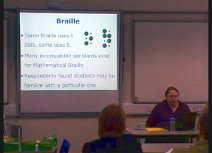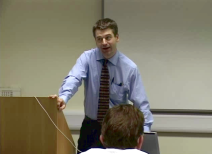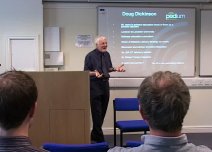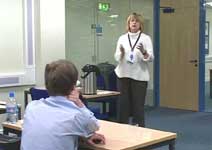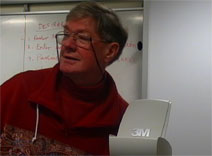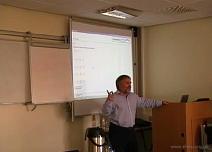This page contains a full list of previous ELMS talks. A list of only those talks for which online video is available can be found on the videos page.
"Using wikis, and only wikis, to teach and assess an advanced mathematics module"
Trevor Hawkes, University of Warwick
6 May 2009
Sixteen mathematics undergraduates at the University of Warwick volunteered to take part in an experimental third-year module in advanced algebra for 12 CATS of course credit. The module was organised and assessed entirely through the medium of wikis. It ran over a period of 16 weeks in the autumn and spring terms of 2007-08 and was divided into eight 2-week 'chapters'. Each chapter began with the posting of an outline syllabus on the wiki. Working in four groups of 4, the students spent the first phase of each fortnight writing their own group wiki, putting flesh on the bare bones of the syllabus by providing lemmas, proofs, examples, history, graphics, and pedagogical content. One of the four group wikis was then 'promoted' to the module wiki and all groups joined forces in the second phase to edit, improve and polish this promoted wiki. Each chapter was assessed, and feedback was given, within a few days on the closing deadline of each of the eight 2-week chapters.
View video for "Using wikis, and only wikis, to teach and assess an advanced mathematics module".
Details of how the module was run can be found here.
The IMPALA project (podcasting in HE)
Dr Palitha Edirisingha, Leicester University
5 March 2009
Palitha Edirisingha of Leicester University speaks about the Informal Mobile Podcasting And Learning Adaptation (IMPALA) Project at the Pedagogy, Blended and elearning Education Research Seminar Series.
View video for The IMPALA project (podcasting in HE).
Find out more about the IMPALA project on the project website.
Nabeel Sulaiman, Nottingham Trent University
4 March 2009
Nabeel Sulaiman presented his PhD research on use of Logo with mathematics teachers in Kuwait.
"Using MathType to create accessible statistics equations with MathML"
Paul Butler and Christopher Terrell-Nield, Nottingham Trent University
21 January 2009
Chris spoke on the reasons he had to create an online resource for stats and what he hoped to achieve by moving it online. Student understanding and late appeals for assistance, a sequential delivery (from basic to more advanced, an interactive site that responds to student inputs, and self teaching site with formative (and submitted) assessments.
Paul talked about how they used MathML to provide an accessible delivery of equations for the tutorial and what it is; MathType editor: how it works and how you get it; Math Player: what browsers handle MathML and how to get it; A view of the use of MathType and a review of the site's equations and some of the issues for production of the tutorial.
"Chalk & Talk and Interactive whiteboards"
Peter Rowlett, Nottingham Trent University
16 December 2008
This talk covered methods for teaching mathematics - chalk and talk and OHP slides to PowerPoint and interactive whiteboards.
Following this was a demonstration of the features of an interactive whiteboard and a chance for the audience to have a go with one themselves.
View video for "Chalk & Talk and Interactive whiteboards".
Download slides for "Chalk & Talk and Interactive whiteboards".
"Visual Impairment in Maths and Computing Based Subjects"
Emma Rowlett, University of Nottingham
30 October 2008
This talk is a result of both Emma's PhD, entitled "Accessing Materials: making appropriate and effective 'reasonable' adjustments for print impaired students in higher education", and a project she has been working on called "AccessMSOR: LaTeX and Braille". Both of these have investigated the experiences of students with visual impairments taking computing and maths based subjects. The talk will present the findings of this work and provide some hands on simulations of what it might be like to be visually impaired and complete maths and computing based tasks.
"AccessMSOR: LaTeX and Braille" is funded by the Higher Education Academy Maths, Stats and OR Network and operated through Physics & Mathematical Sciences, School of Science and Technology, Nottingham Trent University.
View video for "Visual Impairment in Maths and Computing Based Subjects".
"I did this in my class and it (mostly) worked: GeoGebra"
Dr. Chris Sangwin, School of Mathematics, University of Birmingham / Higher Education Academy Maths, Stats and OR Network
13 March 2008
GeoGebra is computer software which is designed as "dynamic mathematics for schools". It is simple to use and free to install: http://www.geogebra.org/cms/
This talk will examine the software and report on its use by myself in university mathematics courses.
(i) What is GeoGebra and what can it do?
(ii) To what extent can GeoGebra be used in university mathematics, by staff and students?
(iii) What are the pitfalls and limitations of this software?
Although relatively simple, the software has a surprising range of uses - allowing dynamic mathematical diagrams to be easily created and used during lectures, tutorials and by students as homework assignments. I conclude this is a very useful additional tool, which can be relatively easily incorporated into existing practice.
View video for "I did this in my class and it (mostly) worked: GeoGebra" .
"METAL Project: Mathematics for Economics: enhancing Teaching & Learning"
Dr Rebecca Taylor, Nottingham Business School, Nottingham Trent University
5 December 2007
Dr Rebecca Taylor is the Head of the Economics Division in NTU's Nottingham Business School and the Director of the HEFCE funded FDTL5 METAL project. This collaborative project has led to the development of several online resources which can be used to address the challenges associated with teaching mathematics to level 1 economics students. Resources include an online question bank, 50 video clips and 10 teaching and learning guides. The talk will give an overview of how the project developed and will demonstrate the resources in their current form.
"Implementing a VLE in a 14-19 College"
Ted Walker, Rawlins College
21 November 2007
Ted Walker is Assistant Principal (Director of e-learning) at Rawlins Community College, Quorn, Leicestershire. Rawlins was an early adopter of whole school use of a VLE, having identified the decentralising and empowering pedagogical principles behind Moodle. Although the vision and transformational potential of the use of Moodle at secondary level is well understood, there are many strategic and operational challenges to be faced before successful implementation leads to meaningful use. The VLE at Rawlins is a well established central part of College life, impacting widely, as well as a basis for improved local collaboration, and the real ambition now is to move beyond the electronic filing cabinet and into the territory of emerging, innovative and exciting educational opportunities.
View video for "Implementing a VLE in a 14-19 College".
"Yes? No? Don't Know? Votes for all, plus the tale of the mouse."
Sidney Tyrrell, Department of Mathematical Sciences, Coventry University
30 October 2007
Sidney Tyrrell is a National Teaching Fellow who has frequently experimented with technology when teaching. Imagine her surprise to find technology (a mouse) that worked first time every time in whatever room with whatever PC, revolutionised her classroom approach to teaching, and cost only approximately £100.
Participants were invited to try out the gyro mouse with the long long range during this talk not on mice but on interactive voting systems. Have they a place in our lectures? Are they worth the effort and what could they offer us? Participants voted on this and other issues using the Turning Point interactive voting system, portable enough to port from Coventry under one arm, for the occasion.
View video for "Yes? No? Don't Know? Votes for all, plus the tale of the mouse." .
"Podcast: Make Yourself Heard"
Doug Dickinson, School of Education, Leicester University
2 May 2007
Podcasting is audio on demand delivered to you automatically which can be listened to or watched (with a vodcast) anywhere, anytime on a suitable device.
It is a simple (that is what makes it so powerful) technological thing to do and allows students to learn in a way which has been placed on the 'back-burner' as other, powerful technologies have come to the fore.
No throwing babies out with bathwater here - Consideration of podcasting give students (and teachers) a positive sense of audience and the potential of raised awareness of the responsibilities and excitement of personal publication.
The Podium software, with its intuitive interface, allows users to concentrate on the quality of the context and content instead of focusing on the technicalities of the production. There is, however, built into the software, many additional features which allow 'poders' to produce sophisticated podcasts of a professional dimension. These features, including, upload of images with each episode, import of MP3 files, scripting etc make a significant difference to the concept of ownership of the completed podcasts.
Doug Dickinson has 40 years experience in teaching in primary education, now an independent ICT consultant working on all aspects of enhancing teaching and learning. Doug lectures at Leicester University School of Education. He has, during the last four years, spent a good deal of time working in Northern Ireland, Hong Kong and Trinidad on a wide variety of topics. He is education consultant to Softease.
View video for "Podcast: Make Yourself Heard".
"Accessing Materials: common problems experienced by students with visual impairments"
Emma Wright, University of Nottingham
14 March 2007
Emma Wright is a PhD student at the University of Nottingham researching the difficulties experienced by students with print impairments and the types of adjustments Universities make for such students. This talk explores some of the common problems experienced by students visual impairments when it comes to accessing course materials, and aims to suggest solutions. The formats that may be required will be outlined, for example: large print, electronic, and Braille. The main focus will be on electronic formats as read by screenreading programs, and on mathematical formulae in particular.
Demonstrations will be provided of how the JAWS (Job Access for Work) screenreader handles such information, and suggestions will be made as to how its accuracy can be improved in some cases.
View "Accessing Materials: common problems experienced by students with visual impairments" slides as PDF slides | PowerPoint slides (This talk contains some audio files which are online available in the PowerPoint version of the slides, or through the online video).
"Accessible for All: Powerpoints"
Dr. Lindsay Evett, School of Computing and Informatics, Nottingham Trent University
7 February 2007
The World Wide Web Consortium's (W3C) Accessibility Guidelines (WCAG) are a recognised international standard for web design for accessibility. Evett and Brown (2005) produced a set of guidelines for producing text which promotes Universal Accessibility. They are consistent with both the aims and the recommendations of the WCAG. The guidelines have been applied to Powerpoint presentations (Evett et al, 2006), and a recent case study has extended their coverage of potential Powerpoint content. The talk describes the case study and the refined guidelines produced. Content accessibility is discussed.
View video for "Accessible for All: Powerpoints".
View "Accessible for All: Powerpoints" slides as PDF slides | PowerPoint slides (since this talk is about PowerPoint, some of the features demonstrated in the video require the PowerPoint slides).
Michael Whapples, School of Physics and Astronomy, University of Nottingham
7 February 2007
Michael Whapples is a visually impaired student of physics at Nottingham university. Within this talk the affect of the use of modern technology on the accessibility of mathematics and science will be discussed. It will cover how technology has altered the way visually impaired people access maths and science, how modern technology can be used to improve accessibility and what currently is not possible and why.
"E-Learning Learning styles - relevant or not?"
Dr. Karen Moss, Centre for Effective Learning in Science, Nottingham Trent University
13 December 2006
Content will look at 'What are learning styles and how relevant are they to design of e-learning materials?'.
Participants will be invited to do an assessment of their Learning style as part of session.
This is based on a research project in CELS using a neural net based system.
View video for "E-Learning Learning styles - relevant or not?".
View "E-Learning Learning styles - relevant or not?" slides as PDF slides | PowerPoint slides
"Testing Tensions: Technology v. Pedagogy in Computer Aided Assessment"
Dr. Trevor Hawkes University of Warwick
22 November 2006
After 12 months leading a project to promote the take-up of computer-aided assessment in Warwick's Science Faculty, I would like to report on the successes, compromises and frustrations that I have met with so far. The talk will be anecdotal and personal with plenty of time for discussion.
Download mp3 audio of "Testing Tensions: Technology v. Pedagogy in Computer Aided Assessment".
When Trevor says "Well, I've got some homework for you... or classwork, really" he hands out this on a piece of paper.
Towards the end of the talk Trevor writes this list of items: "Desirable Pedagogy".
When Trevor talks about broken rendering of mathematics he writes this on the board.
"How to create a question in Perception": PDF | Word Document
"Excerpt on MRQs": PDF | Word Document
"Designing effective online questions in quantitative subjects: pedagogy and programming."
Dr. Martin Greenhow, Brunel University
13 November 2006
This talk will describe developments in Mathletics, a freely-available computer-aided assessment (CAA) system that exploits the open code facilities of Question Mark Perception by using random parameters with all question components, including equations written in MathML and diagrams written in SVG. Thus each of the existing 1700 question styles realises to thousands or even millions of questions for the students, each with rather full feedback that seeks to alert the student to where they have gone wrong by recognising common mistakes or mal-rules.
Pedagogic issues such as choice of question type and "reverse engineering" to keep control of arithmetic/algebraic difficulty will be discussed. The technology, and much of the pedagogy, is exportable to other disciplines where quantitative methods are taught.
19 July 2006
To round off the year, attendees were invited to bring a favourite or interesting mathematical e-learning resource for demonstration and discussion.
Dr. Sarah Carpenter, Assisant Director, sigma - Centre for Excellence in Mathematics & Statistics Support, Loughborough and Coventry Universities
21 June 2006
There are many maths support activities and developments attempting to remedy the decline in the mathematical capabilities of students entering a wide range of degree programmes. This presentation will describe the latest development, SIGMA - Centre for Excellence in Mathematics & Statistics Support. SIGMA is undertaking research into innovative uses of technology and there will demonstrations of how educational and mobile technology, such as the video iPod, can be used to support students in their study of numerate subjects. You will also have the opportunity to discover how you can access a wealth of resources free of charge, from printed mathematics leaflets to video tutorials and animations, that can be used with students.
"Supporting Visually Impaired Physics Students"
Dr. Steve Maddox, School of Physics and Astronomy, University of Nottingham
17 May 2006
Steve is a lecturer and Disability Officer in the University of Nottingham. He will talk about the difficulties experienced in teaching graduate level physics to students with severe visual impairment. In particular he will discuss the problem of presenting mathematical and graphical information to blind students. At present there are no easy solutions, but a useable system has been implemented.
View "Supporting Visually Impaired Physics Students" slides as PDF slides | PowerPoint slides (requires RNIB Braille Font)
"Simulations & Modelling in Science"
Mark Crowley, Centre for Effective Learning in Science / Royal Statistical Society Centre for Statistical Education
22 March 2006
Mark is a science teacher by training and is currently employed as an e-learning developer for school- and university-level projects. Mark will give a demonstration of what he and others have achieved using Excel and Flash to produce simulations and models for teaching and learning in Science.
"Computer algebra and computer aided assessment of mathematics"
Dr. Chris Sangwin, School of Mathematics, University of Birmingham / Higher Education Academy Maths, Stats and OR Network
15 February 2006
The use of computer aided assessment (CAA) is relatively widespread in mathematics. A central feature of all systems is the ability to author and deliver questions over the internet or a local network. The paradigm in CAA is multiple choice (MCQ) or similar questions, in which teacher provided answers are selected by students. The decision to opt for MCQ is almost always a constraint determined by the software and forces the user to strike some uncomfortable compromises with the well-aired limitations and disadvantages of the MCQ format. However, recent developments in CAA that exploit a computer algebra system to evaluate students' free text answers. Such systems can check algebraic equivalence with a correct answer, or an incorrect answer derived from a common mistake. They may also check for mathematical properties of an answer symbolically. Appropriate feedback may then be provided, based on these properties. This seminar will discuss CAA systems based on computer algebra.
"Mathematics for Economics: Enhancing Teaching And Learning (METAL)"
Dr. Rebecca Taylor, Nottingham Business School, Nottingham Trent University
18 January 2006
Since 1990 the teaching of mathematics to economics students has become increasingly challenging for universities across the sector, regardless of entry qualifications. Many Economics (or economics-related) programmes in the UK now have a mixed intake of students with either A-level or GSCE mathematics backgrounds (or equivalents) and the latter may lack practice in the use of mathematical concepts. In addition, the widening participation initiative has led to even greater diversity of student backgrounds, particularly in relation to mathematical skills. Consequently students often do not have the mathematical ability required to successfully complete their first year of study.
Such heterogeneous mathematical skills, coupled with the increasing national focus on interactive, student-focussed and inclusive learning will be addressed by this project through a three-pronged approach to learning that will meet the changing needs of economics students.
The project outcomes will comprise an online question bank of mathematics teaching and assessment materials specifically applied to concepts in economics, 5 interactive video units (covering 10 units of study) using streaming video, dynamic animation and student tracking to relate mathematical concepts to the field of economics and 10 teaching and learning guides that will present innovative and interactive approaches to teaching mathematical concepts to economics students. Topical flow charts will identify different ways to present concepts and to incorporate the question bank and video clips into teaching activities. An interactive website will also be developed to present the teaching and learning resources, to facilitate distance learning and to foster students' autonomy and ownership of the learning process.
The project is led by Dr. Rebecca Taylor from The Nottingham Trent University in partnership with the University of Portsmouth and Brunel University.
Trevor Pull, Learning and Teaching Support, School of Arts Communication and Culture, Nottingham Trent University
21 December 2005
Trevor talked about the Questionmark assessment software. This provided an overview of what can be achieved using Questionmark with particular regard to mathematical content and outlined MathML support.
View "Questionmark" handout: PDF | Word doc
none
16 November 2005
An invite was sent to an open discussion on topics in mathematical e-learning.




